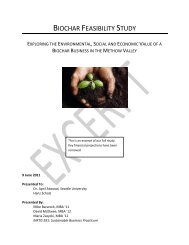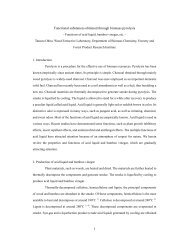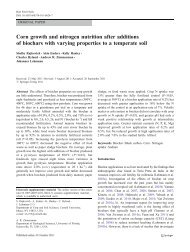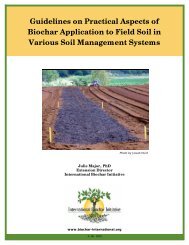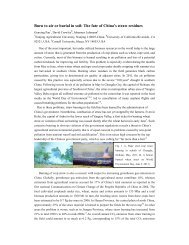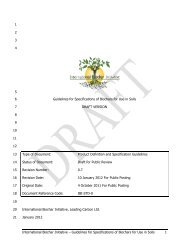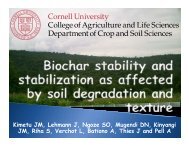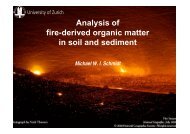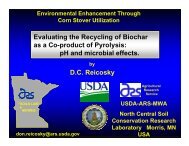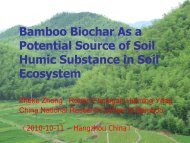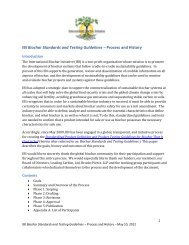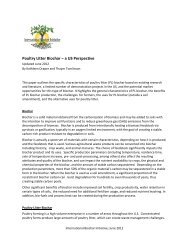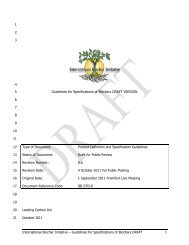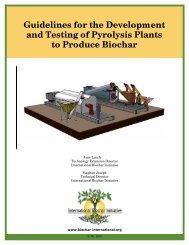November 2012 - International Biochar Initiative
November 2012 - International Biochar Initiative
November 2012 - International Biochar Initiative
Create successful ePaper yourself
Turn your PDF publications into a flip-book with our unique Google optimized e-Paper software.
Report from the First <strong>International</strong> <strong>Biochar</strong> Summer School<br />
The 1 st <strong>International</strong> <strong>Biochar</strong> Summer School “bio: char crossroads” took place in Potsdam,<br />
Germany on September 9-16, <strong>2012</strong>. The event was organized by the Leibniz Institute for<br />
Agricultural Engineering (ATB) and was supported by PEARLS - Potsdam Research Network and<br />
Martin-Luther-Universität Halle-Wittenberg. The goal of this summer school was to enhance<br />
biochar research worldwide and to contribute to the sustainable development of this research<br />
field.<br />
The intensive week offered twenty-three young scientists and young researchers from all over the<br />
world a unique platform for training, information sharing and networking. The participants were<br />
PhD Students that came from Germany, Spain, Denmark, United Kingdom, Italy, Norway, China,<br />
India, and Malaysia. Over twenty international and local experts presented the latest results of<br />
different research fields and discussed future research needs, among them Bruno Glaser from<br />
the Department of Soil Biogeochemistry of the University of Halle, Germany; Claudia Kammann<br />
from the Institute for Plant Ecology, University of Giessen, Germany; Peter Kuikman from Alterra,<br />
Wageningen University, Netherlands; Hermann Lotze-Campen from the Potsdam Institute for<br />
Climate Impact Research (PIK), Germany; David Wayne, Board member of the <strong>International</strong><br />
<strong>Biochar</strong> <strong>Initiative</strong>, UK; Heike Knicker from the Institute of Natural Resources and Agrobiology of<br />
Sevilla, Spain; Ellen Graber from the Volcani Center of the Agricultural Research Organization,<br />
Israel; and many others.<br />
The week started with a keynote on the Amazonian Dark Earths by the renowned Terra Preta<br />
researcher Wenceslau Teixeiera from EMBRAPA <strong>International</strong> Brazil, and also included lectures<br />
on biochar research from Bruno Glaser, Claudia Kamman and Jürgen Kern. After an excursion to<br />
the research facilities of the ATB, participants had a chance to present posters with their research<br />
topics and discuss each subject more intensely.<br />
The following three days were dedicated to major topics in biochar research and development<br />
including biochar production, feedstock availability, system integration and biochar<br />
characterization as well as soil and biota effects of biochar.<br />
Students first focused on biochar production and feedstock which included sessions on pyrolysis,<br />
hydrothermal carbonization, and other alternative carbonization technologies on industrial and<br />
community scales. The feedstock topic was addressed during an interactive workshop<br />
highlighting the life cycle of biochar and lectures on suitable waste streams for biochar production,<br />
as well as controversial issues of biochar and bioenergy in the light of climate change mitigation<br />
and feedstock competition.<br />
After the production/feedstock sessions, students focused on system integration and biochar<br />
characterization. This included sessions on production and application of chars from sewer<br />
sludge and biogas digestate in integrated waste-nutrient streams. The characterization of biochar<br />
involved comparing results from studies of biochar effects, method development, and<br />
standardization on European and international levels.<br />
Students next examined recent results on biochar and soil effects as well as response of plants<br />
and invertebrates on biochar applications in laboratory and field trials.<br />
During the week, Paul Anderson held workshops on low-tech construction of different-sized TLUD<br />
(Top-lit updraft gasifier) stoves and production of biochar for communities with little infrastructure.<br />
The participants spent time in the lab setting up and evaluating simple and “repeatable-at-home”<br />
biochar experiments. Every participant brought a biochar sample from his or her home country to<br />
perform experiments which were combined into a biochar race, comparing the performance of<br />
biochars in germination tests, earthworm avoidance tests, and water holding capacity tests. The<br />
winners of the race received a “<strong>Biochar</strong> Trophy”.



